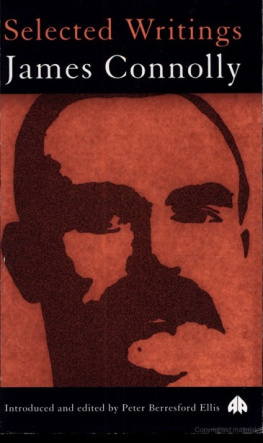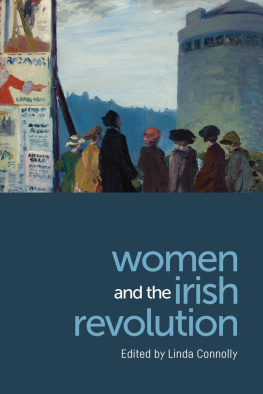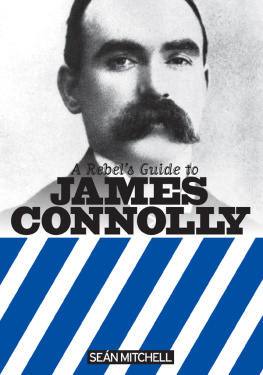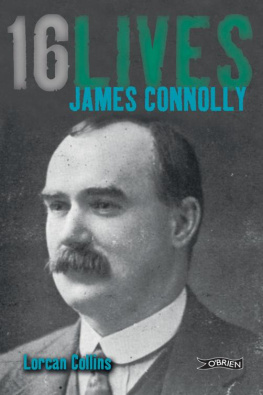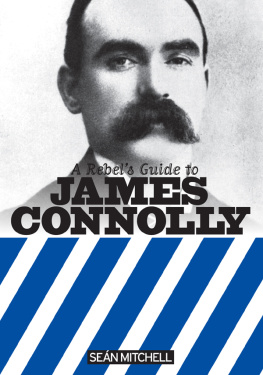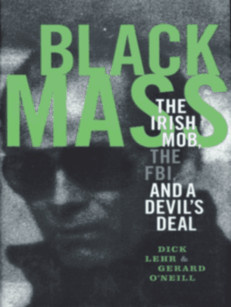TABLE OF CONTENTS
SOCIALISM AND CATHOLICISM
Labour, Nationality and Religion
Being a discussion of the Lenten Discourses against Socialism delivered by Father Kane, S.J., in Gardiner Street Church, Dublin, 1910.
Nature furnishes its wealth to all men in common. God beneficently has created all things that their endowment be common to all living beings, and that the earth became the common property of all ... Only unjust usurpation has created the right of private property.
St. Ambrose .
Let the Pope and cardinals, and all the powers of the Catholic world united make the least encroachment on that constitution, we will protect it with our lives. Summon a General Council let that council interfere in the mode of our electing but an assistant to a turnkey of a prison we deny its right; we reject its usurpation. Let that council lay a tax of one cent. only upon our churches we will not pay it. Yet, we are most obedient Papists we believe that the Pope is Christs vicar on earth, supreme visible head of the Church throughout the world, and lawful successor of St. Peter, prince of the apostles. We believe all this power is in Pope Leo XII and we believe that a General Council is infallible in doctrinal decisions. Yet we deny to Pope and Council united any power to interfere with one title of our political rights, as firmly as we deny the power of interfering with one title of our spiritual rights to the President and Congress. We will obey each in its proper place, we will resist any encroachment by one upon the right of the other.
Rt. Rev. John England, Catholic Bishop of Charleston, U.S.A. , 1824.
Foreword
Nothing is more conducive to the spread of a movement than the discussions arising out of the efforts of a capable opponent to refute its principles. Out of such discussions arise clearness of thought, and the consequent realisation on the part of both sides to the controversy of the necessity of considering the movement under discussion in the light of its essential principles rather than of its accidental accompaniments the basic ideas of the movement itself rather than the ideas of the men or women who may for the moment be its principal exponents or representatives. Men perish, but principles live. Hence the recent effort of ecclesiastics to put the Socialist movement under the ban of the Catholic Church, despite the wild and reckless nature of the statements by which the end was sought to be attained, has had a good effect in compelling Catholics to examine more earnestly their position as laymen, and the status of the clergy as such, as well as their relative duties towards each other within the Church and toward the world in general. One point of Catholic doctrine brought out as a result of such examination is the almost forgotten and sedulously suppressed one, that the Catholic Church is theoretically a community in which the clergy are but the officers serving the laity in a common worship and service of God, and that should the clergy at any time profess or teach doctrines not in conformity with the true teachings of Catholicity it is not only the right, but it is the absolute duty of the laity to refuse such doctrines and to disobey such teaching. Indeed, it is this saving clause in Catholic doctrine which has again and again operated to protect the Church from the result of the mistaken attempts of the clergy to control the secular activities of the laity. It seems to be unavoidable, but it is entirely regrettable, that clergymen consecrated to the worship of God, and supposed to be patterned after a Redeemer who was the embodiment of service and humility, should in their relation to the laity insist upon service and humility being rendered to them instead of by them. Their Master served all mankind in patience and suffering; they insist upon all mankind serving them, and in all questions of the social and political relations of men they require the common laity to bow the neck in a meekness, humility, and submission which the clergy scornfully reject. They have often insisted that the Church is greater than the secular authority, and acted therefore in flat defiance of the secular powers, but they have forgotten or ignored the fact that the laity are a part of the Church, and that therefore the right of rebellion against injustice so freely claimed by the Papacy and the hierarchy is also the inalienable right of the laity. And history proves that in almost every case in which the political or social aspirations of the laity came into opposition to the will of the clergy the laity represented the best interest of the Church as a whole and of mankind in general. Whenever the clergy succeeded in conquering political power in any country the result has been disastrous to the interests of religion and inimical to the progress of humanity. From whence we arrive at the conclusion that he serves religion best who insists upon the clergy of the Catholic Church taking their proper position as servants to the laity, and abandoning their attempt to dominate the public, as they have long dominated the private life of their fellow-Catholics.
The 1910 Lenten Discourses [1]
of Father Kane, S.J., in Gardiner Street Church, Dublin, serve to illustrate these, our contentions. The Socialists of Ireland are grateful to those who induced such a learned and eloquent orator in their capital city to attempt combating Socialism. Had it been an antagonist less worthy their satisfaction would not have been so great. But they now feel confident that when an opponent so capable, so wide in his reading, so skilled in his presentation, so admirable in his method of attack, and so eloquent in his language, has said his final word upon the question, they may rest satisfied that the best case against their cause has been presented which can ever be forthcoming under similar auspices. In presenting their arguments against the position of the reverend lecturer as against his reverend co-workers who all over the world are engaged in the same unworthy task of combating this movement for the uplifting of humanity we desire, in the spirit of our preceding remarks, to place before our readers a brief statement of some of the many instances in which the Catholic laity have been compelled to take political action contrary to the express commands of the Pope and the Catholic hierarchy, and in which subsequent events or the more enlightened conscience of subsequent ages have fully justified the action of the laity and condemned the action of the clergy.
Most of our readers are aware that the first Anglo-Norman invasion of Ireland, in 1169, an invasion characterised by every kind of treachery, outrage, and indiscriminate massacre of the Irish, took place under the authority of a bull issued by his Holiness, Pope Adrian IV. Doubt has been cast upon the authenticity of the bull, but it is certain that neither Adrian nor any of his successors in the Papal chair ever repudiated it.
Every Irish man and woman, most enlightened Englishmen, and practically every foreign nation to-day wish that the Irish had succeeded in preserving their independence against the English king, Henry II, but at a Synod of the Catholic Church, held in Dublin in 1177, according to Rev. P.J. Carew, Professor of Divinity in Maynooth, in his Ecclesiastical History of Ireland , the Legate of Pope Alexander III set forth Henrys right to the sovereignty of Ireland in virtue of the Popes authority, and inculcated the necessity of obeying him under pain of excommunication . The English were not yet eight years in Ireland, the greater part of the country was still closed to them, but already the Irish were being excommunicated for refusing to become slaves.
In Ireland, as in all Catholic countries, a church was a sanctuary in which even the greatest criminal could take refuge and be free from arrest, as the civil authority could not follow upon the consecrated ground. At the Synod of 1177, the Pope, in order to help the English monarch against the Irish, abolished the right of sanctuary in Ireland, and empowered the English to strip the Irish churches, and to hunt the Irish refugees who sought shelter there. The greatest criminals of Europe were safe once they reached the walls of the church, but not an Irish patriot.

